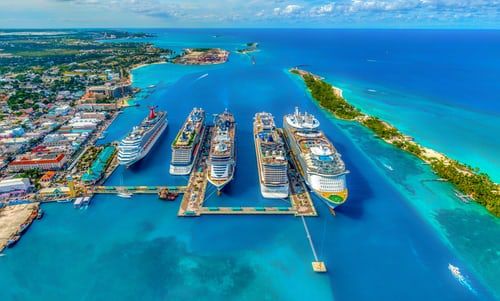Offshore Company Formation For Your Business
Offshore Company Formation For Your Business
Take Advantage of Local Laws in Foreign Jurisdictions
What is an Offshore Company?
An offshore company formation is an entity formed outside the country where its main operations are carried out. The term 'offshore' means that the company acts as a non-resident where it is formed or incorporated. Another prominent feature of an offshore company setup is that usually the company's members and directors live outside the country where the company is incorporated giving the entity a non-residential status.
An offshore company definition, however, is not definite, as it largely depends upon the purview of the entity's activities and the jurisdiction which the business entity was incorporated. Many countries omit the word 'offshore' entirely from the company ordinances even though the entity might function similarly to a company, such as Malta, Cyprus, Scotland, or England.
Herein is what makes the offshore formation service industry so confusing; as many modern financial centers like Luxembourg, Cyprus, and Malta have international business entities that enjoy many of the same benefits in regards to tax benefits and corporate flexibility as traditional Caribbean tax havens even though they are in Europe.
There are, however, some distinguishing features which separate traditional offshore jurisdictions from modern 'onshore' financial centres, namely: fewer reporting requirements, public registries that are not open to the public, and generally as a whole tax havens offer more tax reduction possibilities.
Despite these differences, many of the same financial activities and offshore corporate services can be found in both types of offshore jurisdictions such as the creation of Captive Insurance funds, Hedge Funds, Bank Accounts, and Mutual Funds to name a few.
Offshore companies function very similarly like any other company in a modern onshore or domestic financial centre and can carry much the same business activities, have similar management structures, issue shares to shareholders, etc.—the main difference between onshore and offshore is being the tax structure, the level of confidentiality, and asset protection
Explore Different Company Formation Structures Around The World

- Asia-Pacific
Differences Between Domestic And Non-Resident Companies
There are no clear-cut boundaries between onshore and offshore, as offshore financial services and corporate laws can be found in modern onshore financial centers. The state of Delaware in the United States, for instance, is one of the most historically significant corporate tax havens in the world, and yet know one knows about it.
Its simple legal structure and favorable corporate tax laws were shaped in the early 20th century to make it attractive and easy to form and manage a corporation.
As a result as of today, around 60% of the companies on the Fortune 500 list are incorporated in Delaware, making America one of the largest tax havens in the world.
Panama has taken its inspiration from US corporate laws, originally modeled after Delaware’s in 1927, that have evolved to include progressive business regulations from Lichtenstein creating an offshore financial centre that has parts of both worlds. Many nations aim to attract foreign businesses and investors by making corporate and tax laws friendly to non-residents individuals and international corporations.


Offshore jurisdictions offer tax-exempt status to foreign companies provided they restrict commercial activities outside the jurisdictions’ borders and do not engage in any type of business exchange with local residents. Additionally, many offshore jurisdictions’ corporate laws are written to ensure client confidentiality, the details of which are not usually made available to the public, phishing creditors, or intrusive foreign parties.
This is not to say that your details will never be shared, as it depends on whether the country is party to any TIEAs that are signed with your primary country of residence, which facilitates automatic tax information or are a signatory of the CRS. Both of which make it much more difficult to remain anonymous.
Though places like Panama and Nevis both known for the banking secrecy laws and fierce asset protection clauses, they will not share your details or make you report anything to your own country, however, the issue is the country where you reside which may require you to report your foreign income, assets, or companies.
In this situation, the only way to fully release yourself from the bondage of your home countries reporting and taxation requirements is to move residence and become a primary tax residence of a country that does not tax foreign earned income.
Confidentiality And Asset Protection: The Hallmarks Of Offshore Jurisdictions
Confidentiality, in today's offshore industry, does not mean complete anonymity as it used too, it means that your assets, and business structure are not open to the public and are not shared or given out to curious organizations, creditors, lawyers or whoever comes asking. If you are trying to hide your money from your government. Let me stop you, as you should always follow your country's tax laws.
If your country is a member of the Common Reporting Standard (CRS) or has any Tax Information Exchange Agreements (TIEAs) with the offshore jurisdiction where your company is held then it is likely that your government already has access to your tax information.
- Confidentiality in offshore companies is not about hiding from the government, it is about having privacy so that unscrupulous people, unwarranted lawsuits, threats, spouses, legal disputes etc. will not have access to your company nor your assets.
Despite the changes in the international system forming a properly structured offshore company with a bank account there still are tax advantages, levels of security and asset protection when properly designed are not found in any local domestic company.
Why Offshore Company Formation?
Anyone stands to benefit from incorporating offshore. If we remember that offshore companies aren't necessarily about getting established in some fancy Cayman Islands International Company (although in reality, the Caymans are a lot less fancy and exotic then the name implies).
If you are an American and you form a company in Cyprus, that is considered an offshore company. A foreign company established in a country other than the country of your residence, for all intents and purposes is considered an offshore company.
The confusion that comes for most people is because there is such a tight association with the term offshore companies and illegality. Whether it's money laundering, tax evasion or straight-up drug dealing, the media has done a great job in misinforming people.
Offshore Companies act like any normal company but are held for taxation purposes outside the financial system where it is formed thus giving it certain benefits. Companies formed offshore are often used by anyone who owns a global, internet-based, digital, or services company. It can also act as a holding company for assets or bank accounts, for holding physical property, intellectual property, patents, or investments as well as many other financial and investment-related activities.
The benefits gained will be determined primarily on what one is hoping to achieve. While nearly everyone is hoping to reduce their taxes. It might not necessarily work for everyone to go from paying 40% taxes to 0% overnight. Though anyone can start a company offshore, not everyone receives the same benefits.
Individuals choose offshore companies for any number of reasons. Foreign jurisdictions provide a level of asset protection and security not normally found in traditional 'onshore' jurisdictions. This is because offshore financial centres have supportive corporate laws and liberal regulations that give space for companies to exist without restrictive requirements, high overheads, and onerous disclosure policies.
Such countries have protective legal systems that enable asset-sheltering to non-residents clients who bring their capital into the country. Asset protection gives foreign investors the security needed to securely invest in a foreign country. As a result, many foreign banking and financial systems have created a set of strong legal codes to ensure the industry.
These include ease of incorporation procedures, management flexibility, financial accounting discretion, and nominee services, to name a few. In the next section, we’ll discuss these in more detail.


What Type Of Businesses Benefit?
It really depends on what your business is, where you reside and what you hope to achieve by going offshore. Some individuals who are to benefit the most from a foreign-based company are those with business and financial activities in:
- Offshore savings and investments
- Forex and stock trading
- E-commerce
- Professional service company
- Holding Company
- Internet services
- International based company
- Digital-based Company
- International trading
- Ownership of intellectual property
Companies that are established in an overseas country or conduct business outside the borders where one resides are best suited for international companies as well as businesses with a global or non-localized structure such as internet-based service industries as well as services providers and consultants, brokers, and currency traders.
Online businesses and anything not dependent upon physical infrastructure works best as it gives the individual more room to change locations and not be dependent upon the country of residence to define their tax burden.
For instance, even though you are a citizen of a high tax country, if you hold a UK passport, live in Thailand, have an online e-Commerce business where you take online payments processing in a third country, you could incorporate a business and have an offshore bank in Hong Kong where you would be able to minimize your overall tax burden much more than if you lived, worked and had your company all in the UK.
The defining feature for most people, if they desire to become completely tax-free, will be dependent upon your country of residence. While most people may not be ready to move to a different country to escape taxation, it may not be as difficult as it may seem.
For today's entrepreneur, to best take advantage of your financial freedom, the most reliable strategy is to create a global mindset, by creating an offshore lifestyle maximizing your international leverage by diversifying your residency, company and accounts across multiple jurisdictions.
Advantages Of Incorporating Offshore
An offshore company has a variety of uses and benefits for clients wishing to engage in international financial trade and investment activities. Depending on the specific offshore jurisdiction companies that are formed offshore may have the following features and advantages:
- Ease of Incorporation Registration and incorporation procedures are very straightforward and, in some cases, may take only 24 - 48hrs for the process. This, of course, requires that you prepare and provide all the required documentation before submitting incorporation paperwork to the appropriate authorities.
- Minimal Fees There are very low associated fees, after start-up costs; many jurisdictions have fees between US$200-300 per year.
- Minimal Reporting Requirements Minimal number of directors and shareholders are required. Financial reporting, account information and annual returns are also often not required or remain minimal.
- No Foreign Exchange Controls Most all jurisdictions have no restrictions on foreign exchange.
- Favourable Local Corporate Legislation Many offshore jurisdictions have supportive legal frameworks to promote and encourage the growth of the offshore industry and foreign investment, which supports and gives companies a high degree of flexibility.
- High Confidentiality The details of owners, accounts and financial information remain confidential, though to a varying degree, depending upon the jurisdiction. Some have minimal publicly available information (Hong Kong and New Zealand), whereas in (Nevis, Panama, Seychelles) absolutely no public information is available. The availability and use of nominee shareholders and directors give you greater anonymity.
- Tax Benefits Most jurisdictions offer zero to low corporate taxes, with an exemption on most other taxes such as income, sales, capital gains, value-added, estate, succession, gift, and stamp taxes.
- Freedom in Investment Opportunities No limitation in regards to the business activities involved. Companies are free to engage in virtually any economic, financial or business activity. In some jurisdictions there are necessary formalities and licensing that must be obtained prior to setting up certain types of business operations (as in the case of bank, insurance, real estate industries).
- Relocation Possibilities Many jurisdictions offer smooth transition possibilities between jurisdictions without any needed restructuring or complicated documentation.
Global Tax Laws
TIEA & CRS
The introduction of the Tax Information Exchange Agreement (TIEA), the Common Reporting Standard (CRS) and the American version of the CRS, the FATCA have drastically changed the offshore incorporation industry.
These new pieces of legislation have effectively made it much more difficult to create an offshore structure that bypasses governmental tax regulators. While complete anonymity is much harder to attain it is largely dependent upon the country where you reside and what passport you hold. If you are an American for instance, you will find it nearly impossible.
It's not only Americans who are finding more difficulties in opening up a bank account and incorporating offshore; if you live in any country that is a signatory of the CRS then you will likely find that you are effectively tied to your government's tax authorities. In this case, the only alternative is to either give up your passport (if you are an American) or to move to a tax haven.
The CRS has made if very difficult to reduce your tax burden without moving your residency. An offshore tax haven, in this instance, can be said to be a country that will not tax worldwide income, does not participate in any Tax Information Exchange Agreements Exchange and is not a signatory of the CRS.
The list of tax havens that fit this criteria are not only those few Caribbean islands but include many Eastern European and Asian countries as well. While not everyone may be ready to move or give up their passport, there are a few more alternatives in place that can be used - If - complete confidentiality and tax freedom is your goal.
Though you may be free from taxation in the country where you establish an offshore company. However, that does not free you from your tax obligations altogether. There are other tax laws that make you obligated to report your financial accounts and companies to tax authorities.
Controlled Foreign Corporation (CFC) Laws
Controlled Foreign Corporation (CFC) are set up tax codes that determine the tax liability of the individual in reference to any corporate entities that might be held outside the country.
These laws are used in order to keep assets onshore and prevent the moving of assets to low-tax countries. While this is what is meant in theory, in practice it has done little to stem the flow of capital from low tax countries.
In an increasingly modern world, it has become increasingly difficult to prevent capital from moving to where it has a natural advantage. A liberalized global economy virtually ensures that this will happen due to the nature of trade, banking and global communication that has eroded many barriers to entry.
With lower barriers to entry, it has become possible for nearly any individual to become involved in global finances and international trade. While this was once the exclusive domain of the wealthy, anyone with a mobile phone and a few hundred dollars can now be a global financial citizen.
What Does This All Mean?
If you live in a country that is a signatory of the CRS your tax information is automatically shared. If you live in a country that has CFC laws, then your are obligated to pay taxes on all foreign holdings.
Each country has its own different requirements, there is no one solution for every individual. Depending upon your circumstances, business, and your specific requirements will determine the possibilities open to you, where you are able to incorporate and what advantages you are able to benefit from.
Different Types Of Foreign Companies
There are many different types of offshore companies, each having slight differences usually dependent upon the jurisdiction and the corporate laws where the company is incorporated rather than the name itself.
Offshore entities that roughly refer to the same type of structure:
- Offshore Company, Foreign Corporation, Non-Resident Company, International Business Company, International Company, Private Limited Company
They all are synonyms and can be used interchangeably.
However, there are two main offshore structures which we will go into in detail, namely an:
- International Business Company (IBC) and;
- Limited Liability Company (LLC)
What Is An Offshore IBC (International Business Company) ?
An International Business Company (IBC) refers to a type of offshore structure, which engages in international business activities in trade or investment and remains exempt from local corporate taxation, provided that its revenues does not come from local sources.
- Jurisdictions provide varying degrees of tax benefits, though most usually offer exemption on capital gain tax, corporate tax, income tax and stamp duty.
- An IBC also benefits from confidentiality of ownership (usually), asset protection, a wide versatility of share issuance, flexible management arrangements, and minimal financial reporting requirements.
- There are many such structures available, some of the more popular being Panama, BVI, Belize, Dominica and St. Vincent.
- While they are traditionally known to be originating in tax havens, IBC can be found in modern low tax environments such as Malta, Cyprus, Gibraltar, Scotland
What Is An Offshore LLC (Limited Liability Company)?
A Limited Liability Company (LLC) is a company that provides limited liability to its owners and partners. It is a hybrid business entity with a flexible arrangement, allowing power and responsibilities to be named and distributed through its charter.
- An LLC provides a tax-neutral vehicle that bypasses corporate taxation due to its existence as a partnership. Therefore, the burden of tax falls upon the individual members of the company rather than the entity itself.
- A Member of an LLC has the same responsibilities as a shareholder in a normal company, which may include individuals, companies or trusts and allows for flexible levels of ownership and remuneration.
- The flexibility of an LLC is ideal for structuring international-orientated joint venture arrangements, as the company can enjoy all of the benefits of incorporation, without any tax liability.
There are many benefits of an Offshore LLC which are given due to its pass-through tax structure, making it particularly attractive for investment purposes or for shared business ventures.
How To Register A Company?
- Pick a company name & structure
- Submit a due diligence forms w/ necessary company documents
- Pay government and service prover fees
There are, however, some important questions you should ask yourself when setting up your offshore company.
Once these 3-steps have been completed, we will contact you to establish whether or not there are any additional requirements, documents or signatories needed to successfully file your application with the appropriate jurisdictional Registry.
Forming an offshore corporation is not as complicated as it is often made out to be. In fact, the offshore corporate services industry is often not only easier to establish a company but often is quicker, less hassle with rates even comparable to that of many modern financial centers. To form a company the entity must draw up and submit:
- Memorandum of Association
- Articles of Association
- Know Your Customer (KYC) documents
- Corporate Application Document
- Name, Date of Birth, Social Security or National Insurance Number
- Notarized Bank Statement
- Banking Reference Letter
- Professional Reference Letter
- Copy of Passport for Identity verification
- Copy of Utility Bill to confirm your physical address
Once these documents are approved, there might be additional documents needed to satisfy the Registry then a Certificate of Incorporation is issued signifying the formation of the new company.
Any additional requirements of a newly formed company post-incorporation are dependent upon your needs and wishes, which may include the appointment of the company’s first director, the first meeting and appointment of company officers, registration of directors (in which nominee services may be used), issuance of company shares, and the opening of any international bank account.
The Memorandum of Association represents the companies external affairs and complements the Articles of Association which represents the internal dynamics and structure of the company including the by-laws, purpose of the company, organization of its members including the Director, Shareholder, and Secretarial duties, as well any financial obligations, share capital, meetings, and any day-to-day tasks.
These documents are sent off to the appropriate jurisdictions' Corporate Registers Office.
Offshore Formation With Bank Account (Corporate Or Business Account)
Opening a corporate account for your offshore company is quickly becoming standard practice these days as many foreign jurisdictions are making it more difficult to open a personal account without a local company.
A business or corporate account actually gives you more advantages than a normal personal account and if properly paired with a multi-jurisdictional corporate structure, can be used efficiently to take payment processing from places such as Stripe and Paypal from pretty much anywhere in the world without running into difficulties.
Being able to receive funds from clients and customers is perhaps the most important and the most difficult piece of the offshore puzzle. Making sure that corresponding banks will accept transfers, that your banks will continue to allow large transfers using these mediums while following all of the rules making sure you have fulfilled all of your obligations is why we are here, to help you make sure you have a solid plan in place.
Our Favorite Offshore Corporate Entities

1. Marshall Islands IBC
A Marshall Islands International Business Company (IBC), also known as a Non-Resident Domestic Corporation (NRDC), is a popular offshore structure due to its tax-neutral environment, strong privacy protections, and efficient incorporation process.
Governed by the Business Corporations Act under the Marshall Islands Associations Law of 1990, this structure exempts non-resident companies from all local taxes and has no requirements for filing audited accounts or annual reports. The Marshall Islands offers complete confidentiality for company owners and directors, allowing anonymous ownership through nominee services.
The jurisdiction supports flexible corporate structures, requiring only one director and shareholder, with no restrictions on nationality or residency. With no exchange controls, low annual fees, and rapid formation (1-3 business days), a Marshall Islands IBC is ideal for asset management, tax optimization, and international trade while maintaining high levels of privacy and legal security.

2. Nevis LLC
A Nevis LLC is a popular offshore entity that combines features of both a limited partnership and a private company, offering limited liability to its members and protecting personal assets from company debts. Established under the Nevis Limited Liability Company Ordinance of 1995, it provides strong privacy protections, as the names of beneficial owners and managers are not publicly disclosed, ensuring confidentiality of company records and activities.
Nevis LLCs enjoy tax-free status for income generated outside Nevis, with no corporate, capital gains, or withholding taxes. This structure is ideal for international business, asset protection, and joint ventures, allowing flexibility in management, no residency requirements, and a quick formation process (1-2 business days). Known for its robust asset protection, a Nevis LLC does not recognize foreign judgments, making it secure against external legal claims.

3. Cook Islands LLC
A Cook Islands LLC is a highly flexible offshore entity that combines the benefits of limited liability with strong asset protection and privacy, governed by the Cook Islands Limited Liability Companies Act of 2008. This structure shields members from liability for company debts, and foreign judgments are not recognized in the Cook Islands, offering robust protection against creditors and foreign claims.
With no requirements for local presence, annual accounts, or public disclosure of owners or financial information, a Cook Islands LLC maintains complete confidentiality and privacy. Tax advantages are extensive, with exemptions from corporate, income, capital gains, and estate taxes, making it an attractive choice for asset protection, estate planning, and tax structuring. It can be managed by members or independent managers, making it ideal for real estate holding, investment, and international business ventures when paired with a Cook Islands International Trust for maximum protection.













